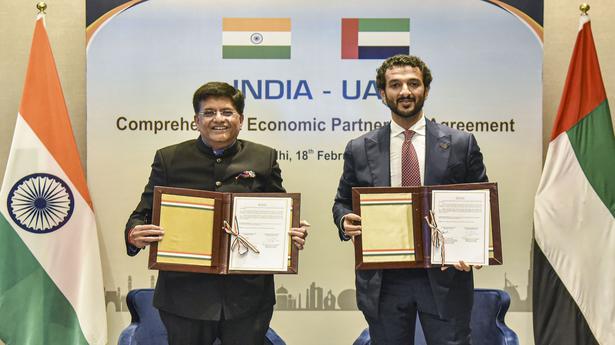
Morning Digest | India, UAE sign comprehensive trade pact; Return penalty, assets seized after anti-CAA protests, SC tells U.P., and more
The Hindu
A select list of stories to read before you start your day
India and the United Arab Emirates (UAE) signed a bilateral “comprehensive” trade pact on Friday. Announcing the Comprehensive Economic Partnership Agreement (CEPA), the biggest trade pact of the last seven years, Prime Minister Narendra Modi welcomed investment from the Gulf country into Jammu and Kashmir and said the initiative would open new routes for regional trade and connectivity and advance “collective interests” of India, Israel, the UAE, and the United States. Commerce and Industry Minister Piyush Goyal said the CEPA would have strong anti-dumping measures.
The Supreme Court on Friday ordered the Uttar Pradesh government to refund damages recovered from the persons accused of “destroying public property” during protests against the Citizenship (Amendment) Act (CAA). The assets recovered by the State, according to the government’s own oral assertion in court, are worth “some crores”. The blow came shortly after the State, on the backfoot days after being accused by the apex court of being the “complainant, adjudicator and prosecutor”, informed a Bench of Justices D.Y. Chandrachud and Surya Kant that it had withdrawn show-cause notices issued by Additional District Magistrates since December 2019 in 274 cases of “alleged destruction of public properties” and subsequent proceedings.
Air India on Friday said it would operate three flights between India and Ukraine next week. These flights are scheduled for February 22, 24 and 26, it tweeted. The flights would operate to the Boryspil International Airport. In response to requests on the micro-blogging site for more flights, the airline stated that it was “in the process of increasing the number [of flights]”.
U.S. President Joe Biden said Friday he’s “convinced” that Russian President Vladimir Putin has decided to launch a further invasion in Ukraine, saying he has “reason to believe” it will occur in the “coming days” and will include an assault on its capital, Kyiv. After weeks of saying that the U.S. wasn’t sure if Mr. Putin had made the final decision to launch a widespread invasion, Mr. Biden said that assessment had changed. “As of this moment I’m convinced he’s made the decision,” Mr. Biden said. “We have reason to believe that.”
A day after former JNU student leader Umar Khalid was produced before a Delhi court in handcuffs following which the court sought an inquiry report from the Delhi Police Commissioner in the matter, senior police officers cited “confusion” and “miscommunication” in court orders as the reason. A senior police officer from the Delhi Police 3rd Battalion, which is responsible for escorting undertrials from jail to court, said, “It was a matter of confusion… A court had earlier issued orders to handcuff Umar Khalid in the JNU sedition case but in another order passed on January 17, it had withdrawn the same, but it was not communicated to us…”
As the sun set on the coastal town of Udupi in Karnataka on Tuesday, 17-year-old Aliya Assadi sat on the steps of Jamia Masjid, her mind racing in different directions. She wants to be a wildlife photographer. She’s worried about her board exams. But her thoughts keep circling back to the violence and anger over her choice of attire: the hijab. Assadi is one of six students at the Government Pre-University College for Girls, Udupi, who has been barred from the classroom since December 27, 2021, for wearing a hijab. “I have been wearing a hijab since I was six years old. It is religious and it gives me a sense of security and confidence. I am uncomfortable removing it. What I don’t understand is why I am being forced to choose between the hijab and education,” she says.
The National Investigation Agency (NIA) on Friday arrested its former Superintendent of Police (SP) Arvind Digvijay Negi on the charge of leaking secret documents of the agency to an accused in a case against overground workers of the terror outfit Lashkar-e-Taiba (LeT). In November last year, the NIA had arrested Kashmir-based human rights activist Khurram Parvez in the same case.













